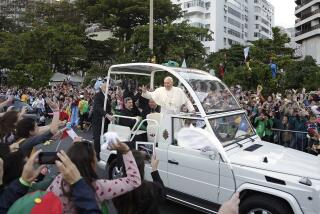Pivotal Moment for Cuba
- Share via
The first objective of Pope John Paul II’s pastoral visit to Cuba has been accomplished with an almost overnight revitalization of the island nation’s Roman Catholicism. Traveling across the island during his five-day stay, the pope appears to have inspired a new climate of tolerance and respect for Catholics and their church in the officially atheist country. It has been a dramatic awakening.
However, the significance of the visit transcends the pontiff’s pastoral mission and presents a political opportunity to make life a little better for all Cubans. John Paul came to tell Castro and his people that they have to open up to the world but also to tell the world it should open up to Cuba. In speeches and homilies the pope articulated his hopes for a Cuba in which basic human rights like freedom of association, education and speech are respected. In his private meetings with Castro, conversations turned on human values and the need to recognize and respect them.
That said, the pontiff also condemned in strong terms the continuing U.S. embargo on trade with the Communist-ruled island.
Now that John Paul has completed this arduous trip and returned to Rome, Americans and Cubans and their antagonistic governments should give thought to turning the pope’s words and principles into permanent deeds. Washington can play a key role as a watchdog for fulfillment of the papal message, but it is the American people who must decide whether the time is at hand to reshape this country’s policy toward Cuba.
The U.S. policy began with the goal of containment, to prevent the Cuban dictator from exporting his revolution across the Americas along with Soviet-influenced Communism and cruel suppression of religious and political freedoms. For 39 years the United States has tried to unseat Castro. The economic embargo was imposed on the island in 1960, and in 1961 strong support was given to the doomed Bay of Pigs invasion by anti-Castro Cubans. Washington toyed with assassination plots. Castro, meanwhile, accepted Soviet missiles on his soil, bringing the world to the edge of war.
The Cuban leader has survived it all, though with an increasingly restive populace. Now, four decades after the revolution, the American strategy includes the Helms-Burton law, with its sanctions against U.S. allies that do business on the island, a gambit that has proved to be a diplomatic disaster.
The embargo remains Castro’s key source of political leverage. It provides him with a scapegoat for his failed economic model. It has given him standing to harass and jail political dissidents, whom he portrays as agents of his old enemy. And because it precludes a U.S. business presence, the embargo has ceded an economic footing to Spain, Canada and others.
The U.S. argument against Cuban Communism no longer holds water. Washington has diplomatic and trade relations with China and Vietnam. But this thing with Castro always has been a neighborhood grudge, the worst kind. Now, with the boost of the papal trip, both Havana and Washington should give hard thought to resolving it in these changing times.
The Cuban people should close ranks behind the papal message and push for positive political and economic change at home. It could prove dangerous, but the timing could not be better. Americans ought to call on Washington for a more enlightened policy, one not driven by Cuban-exile dramatics.
A CBS poll, taken the day the pope arrived in Cuba, found that 55% of Americans support diplomatic relations with Havana and their opinion is evenly split on whether the embargo should be continued, adjusted or lifted. The latter would require undoing Helms-Burton.
Even a small beginning, such as opening a hole in the embargo to permit trade in medical and food supplies, deserves attention. This has gone on far too long. The pope knows it and said so. His words may make a difference.
More to Read
Sign up for Essential California
The most important California stories and recommendations in your inbox every morning.
You may occasionally receive promotional content from the Los Angeles Times.










